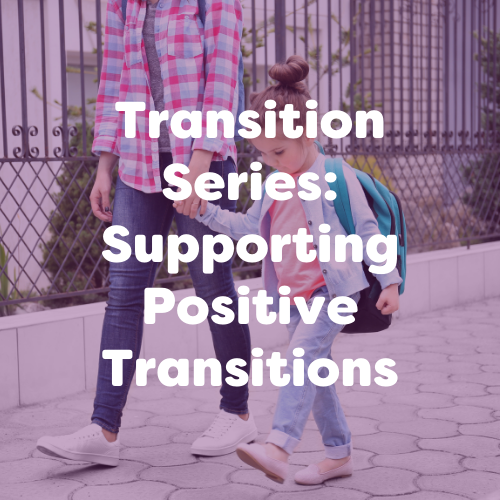This series has been written with the help of EYR industry experts from the University of Cambridge, University of Birmingham, and Manchester Metropolitan University. With the input of these three experts as well as contributions from parents and practitioners, we bring you our transition series. Designed to provide you with unique insights, suggestions, and solutions.
- Understanding transitions
- Improving the transition experience
- Getting School ready: a Parent’s Advice

What are transitions?
It is that time of year again when children are transitioning into the first or next stage of education. The mix of excitement and anxiety can be a lot for little ones to handle. Making it all of our responsibility to help them process and express these emotions healthily and constructively.
As a parent, the hardest part is sending my children off to an environment that will expect more than they are used to, more structure and expectations
From smaller changes like a new activity to bigger transitions like starting childcare, various factors contribute to a child’s ability to cope. These influences can be used to gain an understanding of a child’s mind as they go through this transition period. With this additional knowledge, we can learn to better support them throughout.
In this blog we will be exploring the following 3 factors:
- Executive Function: Psychologists use this term to refer to the set of self-regulatory skills that underpin our ability – in novel or high stakes situations – to monitor and plan our actions.
- Mind Reading: Understanding other people’s thoughts and feelings and being able to take someone else’s point of view.
- Attachment Theory: Dependable primary caregivers allow a child to develop a sense of security. The caregiver becomes a safe base from which the child can explore the world.
1. Executive Function
Executive function is a set of mental skills that include working memory, flexible thinking, and self-control. These skills begin to develop in the first few years of life and are important for children’s success in starting school and later academic progress.
The recognition of their importance has led to reforms in the Reception Year national curriculum. This now includes activities to foster children’s self-regulatory skills.
In a classic study, researchers from Stanford University demonstrated that children who can wait to get a bigger reward, are more likely to be high achievers later in life. Why not try this experiment with your little ones?

Link to transition
Issues with executive functioning can affect children differently. However, younger children tend to demonstrate a tendency to be inflexible or have a hard time with change and transitions.
2. Mind Reading
Consider the following story:
Georgie is given some chocolate by her mum. Georgie wants to eat the chocolate later so she puts it in the fridge before going outside to play. While Georgie is outside, Ted takes the chocolate out of the fridge and puts it in the cupboard. When Georgie returns, where will she look for the chocolate? Will she look in the fridge or the cupboard?

Children who can “mind read” recognise that Georgie thinks the chocolate is in the fridge and so will look there rather than in the cupboard. They overcome their point of view and understand that Georgie did not know that Ted moved the chocolate while she was outside.
Children first begin to tune into other people’s thoughts between the ages of 3 and 6 but they continue to refine their skills throughout the primary years. Mind reading is not an all-or-nothing affair though. Within each age group, some children find it easy to understand other people’s thoughts and feelings while other children find it more challenging.
Link to transition
- Children who become effective mind readers are less likely to become overwhelmed with emotion and are more likely to use words to describe needs and feelings over behaviour.
- Children with good “mind-reading” skills are likely to be popular with peers, and better at building and maintaining social relationships in school.
- Beyond social skills, these same children are better at interpreting the meaning of a text and even have a greater grasp of concepts related to scientific reasoning, indicating academic success
3. Attachment Theory
Attachment between a child and caregiver is one of the most important factors in a child’s development. Especially about brain development and the development of emotional and social skills.
The type of attachment relationship has a significant impact on how the child will deal with separation and change. If a positive, secure attachment is formed, children will feel safe to explore the world confidently.

Link to transition
Attachments are a contributing factor in transitions as children with secure attachment relationships will tackle new situations, such as a new school, effectively and confidently.
Next in the series
Read the next instalment in our transition series Improving The Transition Experience
Meet the experts
Dr Sarah Parry
Clinical Psychologist & Practice Fellow at Manchester Metropolitan University (@drSarahParry)
Dr Rory Devine
Lecturer in Developmental Psychology at the University of Birmingham
Professor Claire Hughes
Deputy Director, Centre for Family Research at the University of Cambridge




